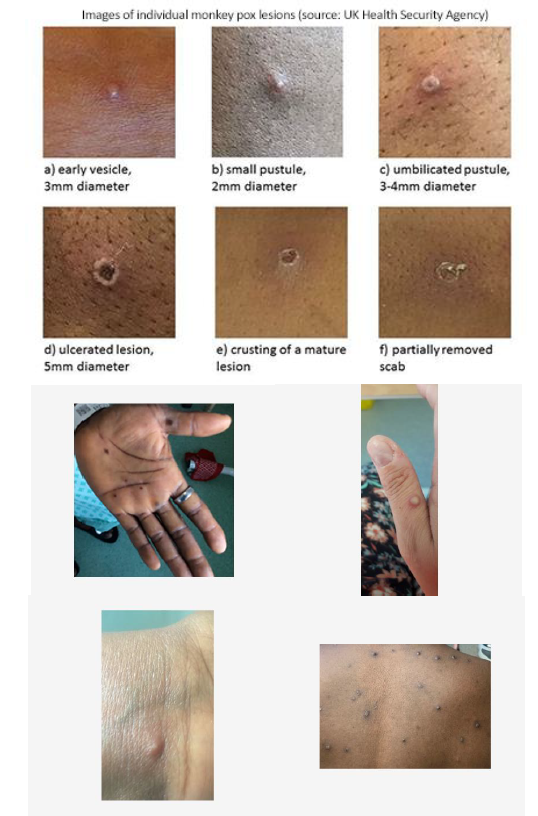As the worldwide outbreak of the monkeypox virus continues to unfold, we are updating you on our work as a Union on this matter.
Information about monkeypox:
Public Health Agency of Canada (PHAC) monkeypox outbreak home page:
https://www.canada.ca/en/public-health/services/diseases/monkeypox.html
PHAC Travel Health Notice:
https://travel.gc.ca/travelling/health-safety/travel-health-notices/229
CDC Information page on monkeypox (en anglais seulement):
https://www.cdc.gov/poxvirus/monkeypox/index.html
Monkeypox vaccine campaigns:
The Imvamune® vaccine is authorized by Health Canada for immunization against monkeypox and orthopoxvirus infections in adults 18 years of age and older who are at high risk of exposure.
The National Advisory Committee on Immunization (NACI) recommends the Imvamune® vaccine may be offered to people with high-risk exposures to a probable or confirmed case of monkeypox, or within a setting where transmission is happening.
At the time of publication of this bulletin, most provinces experiencing outbreaks are offering targeted vaccination campaigns. To find out if you are eligible, contact your local public health provider by calling 8-1-1 or visiting your provincial health authority’s monkeypox information page (tip. Search with keywords “your province” + monkeypox vaccine)
What can you do to protect yourself?
Most of the protections for monkeypox are already available and familiar due to the ongoing COVID-19 pandemic. CUPE continues to strongly recommend we follow the precautionary principle and encourage members to avail themselves of the available personal protective equipment.
Therefore, when at work (aircraft, airport, transportation, and layovers) we advise:
- avoiding direct personal contact
- continuing to use respiratory protection like N95 respirators or their equivalent, or double masking (cloth over surgical) to provide protection.
- The use of gloves whenever you may come into contact with service items (utensils, dishware, linens/hot towels, refuse items) contaminated by secretions, or which could have contacted skin lesions (ex. Pickup). Gloves are also important when engaging in any activities like first aid which may require skin-skin contact.
- On a layover, respiratory protection remains important as does avoiding crowded venues, and practicing physical distancing whenever possible. Concerns about your room (ex. bed linens) should be addressed with the hotel and reported to your company to conduct a follow-up.
For the most up-to-date general guidance see the PHAC monkeypox home page (link above).
What to do if you notice signs or symptoms (List of symptoms below)?
Though these signs and symptoms may not be all be related to an exposure to Monkey Pox, early medical diagnosis is key to obtaining access to medical treatments including Imvamune vaccine post-exposure prophylaxis (PEP) and medication which can stop symptomatic illness or greatly reduce the severity of symptoms. If you have any concerns that you have had a high risk exposure:
- From point of the first onset, the virus is contagious. However, the initial signs and symptoms may not be clear. Be aware of your health status at all times so you that can monitor for small changes. For example, don’t dismiss any strange symptoms like what could appear to be pimples on your hands or feet.
- If you notice potential symptoms, contact your doctor or public health by speaking to a nurse at 8-1-1 to determine the next steps. This is particularly important if you have reason to suspect having had close contact.
- Don’t come to work while sick.
Only a doctor can confirm Monkey pox using all signs and symptoms present and tools available to diagnose.
Monkeypox symptoms:
People usually develop symptoms 5 to 21 days after being exposed to the monkeypox virus. Symptoms typically last from 2 to 4 weeks and may not all occur at once:
- A rash is characterized by lesions that pass through different stages. They can be painful and could affect any part of the body (see images below)
- Fever
- Chills
- swollen lymph nodes
- headache
- muscle pain
- joint pain
- back pain
- exhaustion

Source: https://www.cdc.gov/poxvirus/monkeypox/symptoms.html
Stigma:
We are increasingly frustrated and concerned by the notion that there is a “limited spread” of the virus and that there isn’t a need to do much more about this.
The Public Health Agency of Canada is clear in its guidance that monkeypox doesn’t discriminate and can be transmitted between individuals regardless of gender and sexual orientation. It is not an STI. It is crucial that the LGBTQ2+ community gets strong support during this health crisis, but it is also incumbent upon all of us to take the situation seriously and exercise appropriate precautions to avoid the disease spreading further and curbing the outbreak.
In solidarity,
Your Air Canada Component of CUPE Health and Safety Committee
